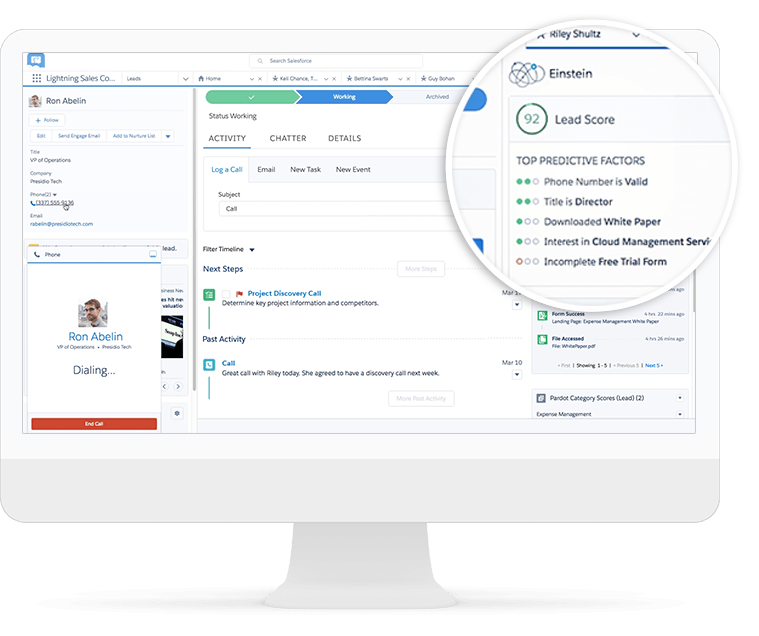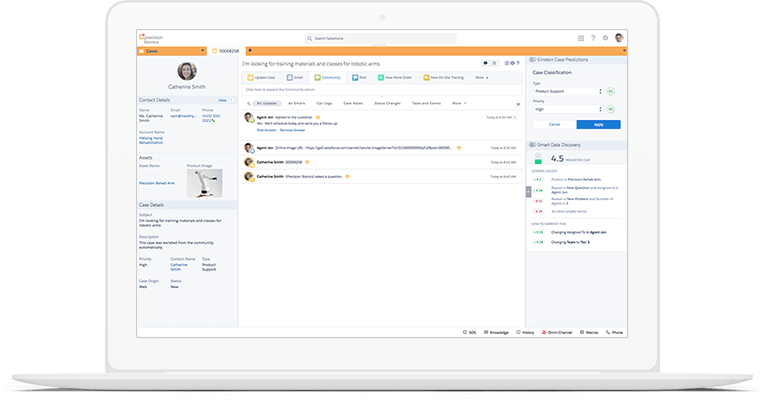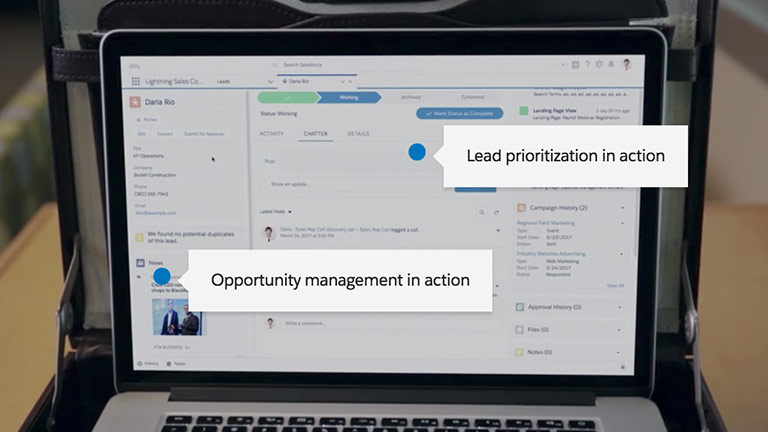CRM Explained: Who is Customer Relationship Management System for?
Who is CRM / Customer Relationship Management System for?
A CRM system gives everyone — from sales, customer service, business development, recruiting, marketing, or any other line of business — a better way to manage the external interactions and relationships that drive success. A CRM tool lets you store customer and prospect contact information, identify sales opportunities, record service issues, and manage marketing campaigns, all in one central location — and make information about every customer interaction available to anyone at your company who might need it.
With visibility and easy access to data, it's easier to collaborate and increase productivity. Everyone in your company can see how customers have been communicated with, what they’ve bought, when they last purchased, what they paid, and so much more. CRM can help companies of all sizes drive business growth, and it can be especially beneficial to a small business, where teams often need to find ways to do more with less.

Here’s why CRM matters to your business
Gartner predicts that by 2021, CRM will be the single largest revenue area of spending in enterprise software. If your business is going to last, you know that you need a strategy for the future. You have targets for sales, business objectives, and profitability. But getting up-to-date, reliable information on your progress can be tricky. How do you translate the many streams of data coming in from sales, customer service, marketing, and social media monitoring into useful business information?
A CRM system can give you a clear overview of your customers. You can see everything in one place — a simple, customizable dashboard that can tell you a customer’s previous history with you, the status of their orders, any outstanding customer service issues, and more.
You can even choose to include information from their public social media activity — their likes and dislikes, what they are saying and sharing about you or your competitors. Marketers can use a CRM solution to better understand the pipeline of sales or prospects coming in, making forecasting simpler and more accurate. You’ll have clear visibility of every opportunity or lead, showing you a clear path from inquiries to sales. Some of the biggest gains in productivity can come from moving beyond CRM as a sales and marketing tool and embedding it in your business – from HR to customer services and supply-chain management.
Though CRM systems have traditionally been used as sales and marketing tools, customer service teams are seeing great benefits in using them. Today’s customer might raise an issue in one channel — say, Twitter — and then switch to email or telephone to resolve it in private. A CRM platform lets you manage the inquiry across channels without losing track, and gives sales, service, and marketing a single view of the customer.
Read informative blog about Visitor Management ERP Software by Alicesoft.
Running a business without CRM can cost you real money
More administration means less time for everything else. An active sales team can generate a flood of data. Reps are out on the road talking to customers, meeting prospects, and finding out valuable information – but all too often this information gets stored in handwritten notes, laptops, or inside the heads of your salespeople.
Don’t make tracking and managing customer information harder than it needs to be. CRM ensures your data is in one place and can easily be updated by anyone, anytime.
Details can get lost, meetings are not followed up on promptly, and prioritizing customers can be a matter of guesswork rather than a rigorous exercise based on fact. And it can all be compounded if a key salesperson moves on. But it's not just sales that suffer without CRM.
Your customers may be contacting you on a range of different platforms including phone, email, or social media — asking questions, following up on orders, or contacting you about an issue. Without a common platform for customer interactions, communications can be missed or lost in the flood of information — leading to a slow or unsatisfactory response.
Even if you do successfully collect all this data, you’re faced with the challenge of making sense of it. It can be difficult to extract intelligence. Reports can be hard to create and they can waste valuable selling time. Managers can lose sight of what their teams are up to, which means that they can’t offer the right support at the right time – while a lack of oversight can also result in a lack of accountability from the team.
What does a CRM system do?
A customer relationship management (CRM) solution helps you find new customers, win their business, and keep them happy by organizing customer and prospect information in a way that helps you build stronger relationships with them and grow your business faster. CRM systems start by collecting a customer's website, email, telephone, social media data, and more, across multiple sources and channels. It may also automatically pull in other information, such as recent news about the company's activity, and it can store personal details, such as a client's personal preferences on communications. The CRM tool organizes this information to give you a complete record of individuals and companies overall, so you can better understand your relationship over time.
A CRM platform can also connect to other business apps that help you to develop customer relationships. CRM solutions today are more open and can integrate with your favorite business tools, such as document signing, accounting and billing, and surveys so that information flows both ways to give you a true 360-degree view of your customer.
Learn more about the process for CRM Training and Onboarding for Real Estate Teams.
And a new generation of CRM goes one step further: Built-in intelligence automates administrative tasks, like data entry and lead or service case routing, so you can free up time for more valuable activities. Automatically generated insights help you understand your customers better, even predicting how they will feel and act so that you can prepare the right outreach.

Here’s how a CRM system can help your business today.
1. MAKE IMPROVEMENTS TO YOUR BOTTOM LINE
Introducing a CRM platform has been shown to produce real results – including direct improvements to the bottom line. CRM applications have a proven track record of increasing:
2. IDENTIFY AND CATEGORISE LEADS
A CRM system can help you identify and add new leads easily and quickly, and categorize them accurately. By focusing on the right leads, sales can prioritize the opportunities that will close deals, and marketing can identify leads that need more nurturing and prime them to become quality leads.
With complete, accurate, centrally held information about clients and prospects, sales and marketing can focus their attention and energy on the right clients.
3. INCREASE REFERRALS FROM EXISTING CUSTOMERS
By understanding your customers better, cross-selling and upselling opportunities become clear — giving you the chance to win new business from existing customers. With better visibility, you’ll also be able to keep your customers happy with better service. Happy customers are likely to become repeat customers and repeat customers spend more — up to 33% more according to some studies.
Use and Experience Easiest Visitor Management System Technology by Alicesoft.
4. OFFER BETTER CUSTOMER SUPPORT
Today's customers expect fast, personalized support, at any time of day or night. A CRM system can help you provide the high-quality service that customers are looking for. Your agents can quickly see what products customers have ordered, and they can get a record of every interaction so they can give customers the answers they need, fast.

5. IMPROVE PRODUCTS AND SERVICES.
A good CRM system will gather information from a huge variety of sources across your business and beyond. This gives you unprecedented insights into how your customers feel and what they are saying about your organization — so you can improve what you offer, spot problems early, and identify gaps.

Here’s how a CRM can future-proof your business
As the COVID-19 pandemic has proven, a business’s ability to be responsive to external changes can make or break. While some businesses have fallen, others have pivoted and been able to adapt their products or services to reach customers in a different way, garnering a whole new customer base. A few have grown – think e-commerce, logistics, and pharmaceuticals. For all these businesses, it’s the customer who is at the center.
Sanjay Gupta, Country Head and VP of Google India has seen a massive adoption of digital and technology in the country. He says, “India is…a low internet penetration country at about 33(%). Rapid digitization will accelerate the numbers. There were 1.34 billion online transactions in June 2020 – up 80-90% on the year before.”
So what can a CRM do for your business? We look at how a robust system can ensure your business is ready for the age of the connected consumer, who expects a consistently excellent experience across the customer journey.
1. BOOST CUSTOMER EXPERIENCE WITH UNIFIED CRM SYSTEMS FOR SALES, MARKETING, AND CUSTOMER SERVICE
A unified customer relationship management system can connect sales, marketing, and customer service to create a holistic view of a business’s customers. With 62% of customers prepared to share a bad experience with others, the benefits of ensuring the customer journey is optimal can’t be overstated. 66% of millennial consumers expect real-time responses and interactions, and 40% of all customers won’t do business with a company if they can’t use their preferred modes of communication. A CRM that stores all these interactions, across devices and times, can improve the customer experience.
Quickly responding to customer requirements is key to their experience. In response to COVID-19, Edelweiss Global Wealth Management has accelerated digital transformation and adoption. Customers continue to have 24/7 access to their funds and to financial advisors. To ensure that these orders are processed smoothly, Edelweiss has driven up the adoption of the Salesforce Mobile App across its workforce, with an additional layer of security built-in to make transactions more secure. All employees now use the app to access data on customers and transactions right on their mobile devices, resulting in agile execution and uninterrupted customer service. The Salesforce mobile app also continues to record customer calls, enabling employees to stay attuned to customer needs and feedback.
Read all about Real Estate ERP Software here!
2. PROVIDE ENGAGING AND UNBEATABLE USER EXPERIENCE THROUGH HYPER-PERSONALISATION
In order to truly personalize the customer experience, businesses need to ensure that each interaction is defined by the customer themselves. 61% of millennials are happy to share personal data which leads to a more personalized shopping experience, and it’s this cohort that is embracing the benefits of hyper-personalization.
Hyper-personalization can refer to actually customizing products; offering particular products in particular locations based on what’s trending; leveraging omnichannel data to personalize communications; or real-time engagement. 84% of customers say being treated like a person, not a number is very important to them. The meaningful engagement offered by hyper-personalization can lead to an improved customer experience, coupling user satisfaction with improved sales.
3. AI-POWERED CRMS CAN IMPROVE DECISION-MAKING AND PRODUCTIVITY
Businesses can make smarter and faster decisions with help of Artificial Intelligence (AI). With 64% of customers expecting tailored engagement based on past interactions, marketing AI can collate data from interactions to predict the messaging your customers will most likely respond to. With 71% of customers have used multiple channels to start and complete a single transaction, using AI to track customers across mediums and devices is vital for sales. And at the operational end, 68% of customers would rather use self-service channels – like knowledge bases or customer portals – for simple questions or issues.
4. LEVERAGE THE INTERNET OF THINGS (IOT) TO POWER CUSTOMER ENGAGEMENT
With connected devices all around us, a constant stream of data can flow into the CRM platform. The Internet of Things is predicted to increase global corporate profits by about 21% over the next decade. It also has buy-in from the customer – 77% of users say connected devices (such as smart speakers, fitness trackers, and security systems) make their lives easier. This all powers an opportunity to improve customer engagement, as well as boost research and product development.
5. IMPROVE RETENTION THROUGH CUSTOMER-ORIENTED PROCESSES
84% of customers say the experience that a company provides is as important to them as its products and services. It’s this experience that often drives retention.
Retention is inextricably linked to a company’s bottom line. 89% of customers are more loyal to companies they trust, and 65% have stopped buying from companies that did something they consider distrustful.
GEP is a leading provider of procurement and supply chain software, strategy, and managed services for Fortune 500 companies. During the COVID-19 pandemic, each of GEP’s customers faced daunting challenges because of supply chain disruptions, lockdowns, and wild swings in demand. A consumer products company, for instance, needed to ramp up its supply chain to meet double-digit increased demand. On the other hand, a technology firm saw procurement disruption as suppliers and suppliers’ suppliers were unable to source components and raw materials. GEP’s Customer Support Operations team supported all customers without missing a beat while working from home around the globe, enabling the consumer goods company to meet the sudden spike in demand, and the equipment manufacturer to quickly source new suppliers and significantly reduce risk in its supply chain. From March to June 2020 GEP’s service team delivered an improvement in SLAs by 5%, and case resolution time dropped by 23%. The volume of cases resolved in less than four hours remained unchanged.
A CRM can future-proof your business by connecting you with your customer – providing hyper-personalized engagement that is viewable across business teams, powered by data from connected devices, and informed by AI, all designed to improve retention by focusing on your customer’s unique needs.
Here’s what cloud-based CRM offers your business
CRM and the cloud computing revolution have changed everything. Perhaps the most significant recent development in CRM systems has been the move into the cloud from on-premises CRM software. Freed from the need to install software on hundreds or thousands of desktop computers and mobile devices, organizations worldwide are discovering the benefits of moving data, software, and services into a secure online environment.
WORK FROM ANYWHERE
Cloud-based CRM systems such as Salesforce, mean every user has the same information, all the time. Your sales teams out on the road can check data, update it instantly after a meeting, or work from anywhere. The same information is available to anyone who needs it, from the sales team to the customer service representatives.
REDUCE COSTS
CRM can be quick and easy to implement. A cloud-based system doesn’t need special installation, and there’s no hardware to set up, keeping IT costs low and removing the headache of version control and update schedules.
Generally, cloud-based CRM systems are priced on the number of users who access the system and the kinds of features you need. This can be very cost-effective in terms of capital outlay, and is also extremely flexible — enabling you to scale up and add more people as your business grows. Salesforce is flexible in terms of functionality, too — you’re not paying for any features that are not useful to you.
A CLOUD-BASED CRM PLATFORM OFFERS YOU:
- Faster deployment
- Automatic software updates
- Cost-effectiveness and scalability
- The ability to work from anywhere, on any device
- Increased collaboration.
Connecting Point Solutions in Your CRM with a Multifaceted Real Estate ERP System
Connecting point solutions in your CRM (Customer Relationship Management) with a multifaceted Real Estate ERP (Enterprise Resource Planning) system can help you streamline your operations, improve data accuracy, and increase efficiency. Here are some ways in which connecting your CRM with a Real Estate ERP system can benefit your business:
-
Seamless Data Integration: By connecting your CRM with a Real Estate ERP system, you can seamlessly integrate data between the two systems. This can help ensure that data is accurate and up-to-date across both systems, reducing the risk of errors and duplication.
-
Improved Collaboration: Connecting your CRM with a Real Estate ERP system can improve collaboration between departments and teams. This can help ensure that everyone is on the same page and has access to the same information, which can help improve decision-making and reduce the risk of miscommunication.
-
Enhanced Reporting: Connecting your CRM with a Real Estate ERP system can help enhance reporting capabilities by providing real-time access to data across both systems. This can help you make more informed decisions and identify areas where you can improve your operations.
-
Streamlined Sales Processes: By connecting your CRM with a Real Estate ERP system, you can streamline your sales processes by automating tasks such as lead generation, qualification, and tracking. This can help reduce the workload on your sales team and improve the efficiency of your sales processes.
-
Improved Customer Service: Connecting your CRM with a Real Estate ERP system can improve customer service by providing a complete view of customer interactions across all touchpoints. This can help ensure that customers receive consistent and personalized service, which can help improve customer satisfaction and retention.
In summary, connecting point solutions in your CRM with a multifaceted Real Estate ERP system can help you streamline your operations, improve data accuracy, and increase efficiency. If you are considering implementing a Real Estate ERP system for your business, it is important to choose a solution that is tailored to your specific needs and requirements and to ensure that it integrates seamlessly with your existing systems and applications.